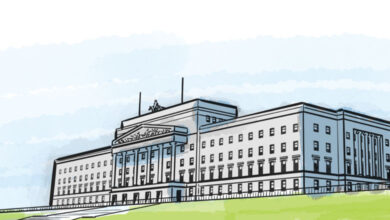A new script for mental health

If we do not flip the script around mental health, we will fail to ever get to grips with this spiralling crisis, one which is costing us all so dearly, writes organiser at PPR, Sara Boyce.
As human beings we make sense of our world through stories. Our understanding and world views grow from the stories we have been told within our families, community and wider society. The most powerful stories can be unspoken, but nonetheless are deeply embedded in our culture and society.
Sometimes though, the narratives that once held significant sway, no longer make sense to us and worse, we begin to see the harm they have caused.
Person-centred. Trauma-informed. Recovery-focused. These are often buzz words that are poorly reflected in mental health care. The medical, disease model continues to dominate the mental illness narrative.
This is evident in a year-on-year rise of between 3 and 5 per cent in prescribing of antidepressants in Northern Ireland, with an increase of 128,865 prescriptions for antidepressants in 2021 alone, despite no clear evidence for how they actually work.
It is high time that we ‘surface’ the story around mental health. We need to start a new conversation that does not begin with ‘What is wrong with you?’
This approach locates blame within individuals and reinforces a medical model such as the belief that mental health problems are caused by a chemical imbalance in the brain.
This dominant narrative brings with it much shame and blame for individuals. In essence it pathologises, depoliticises, and individualises emotional distress.
It also determines how mental health services respond, with the evidence on that score deeply concerning. For example, the annual spend on talking therapies amounts to roughly one-sixth of what is spent on medication.
The current mental health system’s priorities often run counter to the global trend, which recognises the need for community-based, non-medicalised responses to trauma and distress.
We all know the scale of mental health need and the huge issues facing anyone who tries to access help. Both are set to worsen in the aftermath of Covid and the current cost-of-living crisis.
Waiting lists continue to worsen; a 52 per cent increase since April 2021 in the number of children experiencing significant levels of emotional distress, who are waiting for help.
Individuals who bravely reach out for help, face a 10-minute online consultation with their GP, a prescription, and if fortunate enough, the offer of short-term counselling. Even when referred for a mental health assessment, people face further lengthy waiting times.
There have been calls for increased funding of approximately 34 per cent, or £1.2 billion over 10 years for the implementation of the Mental Health Strategy.
Without question, mental health services have been starved of funding and must now be adequately resourced. Yet we know that our mental health crisis goes much deeper than funding alone.
Our response as a society must be rooted in human rights and trauma-informed principles of connection, compassion, community, and choice. We know that these are vital to healing when we experience emotional pain and trauma.
When a flower fails to bloom, we do not blame the flower. It is time to start addressing root causes. Injustices and inequalities; asking people what matters to them and developing relationships and spaces where people feel safe enough to talk about what happened to them.
It is time to have an open conversation about mental health. On Wednesday, 1 February 2023, in the MAC Belfast, we will launch New Script for Mental Health. We would love you to join us and take part in this important conversation.
For more information contact Sara Boyce PPR sara@pprproject.org or 07864074235.





